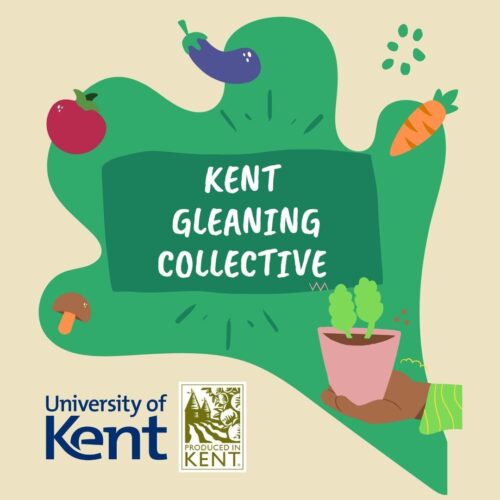
20th April 2023
Kent tackles farming food waste with University collaboration
Click the link to listen to Flo chatting with Steve Ladner on BBC Radio Kent about the Kent Gleaning Collective
Become a Gleaning Volunteer
The University of Kent and Produced in Kent are together launching a gleaning project that will see students work with farms to tackle food waste and reduce the environmental impact of surplus food, which currently accounts for 6-7% of greenhouse gas emissions every year in the UK.
The project will support farms in the Kent Downs Area of Outstanding Natural Beauty (AONB) redistributing produce to businesses, charities and community groups in the Canterbury area, using the FoodLoop app – an app developed by Produced in Kent, which connects those who have surplus food with those who need it. Statistics on volumes of surplus gleaned from Kent fields and redistributed to those who need it, will be collected through FoodLoop and shared publicly.
The project will be supported by established local gleaning groups Deal with It and Hythe Environmental Community Group, who will train the students in the art of gleaning. The food redistribution infrastructure developed through the project can be replicated in other areas of the county.
In October 2022, the WWF released the ‘Hidden Waste’ report, which estimated that almost 3 million tonnes of edible food – valued at £1.8 billion and equivalent to 6.9 billion meals, or over 18 million meals a day – goes to waste on UK farms each year. Meanwhile, it is estimated that one in seven people across the UK skipped meals or went without food in 2022 because they could not afford or access food, according to the Food Foundation.
Floortje Hoette, Chief Executive of Produced in Kent, said: ‘Farms are ending up with surplus food for different reasons. Weather conditions, quality and/or price expectations from buyers and lack of seasonal labour can all lead to surplus on the farm, with some of it left in the field. Through this gleaning project, we want to help farmers find a more sustainable and local solution for their surplus whilst helping the community access more fresh produce and introducing students to the realities of farming.
‘With the help of the FoodLoop app we will log the volume of surplus produce redistributed during the project period and share those figures with local Government. This hopefully opens a discussion on how we can solve some of the causes of surplus food on the farm. Produced in Kent is very grateful for the funding obtained through the Farming in Protected Landscapes and Helping Hands funds, that enables us to develop a very hands-on project that has the potential of helping lots of people in many different ways.’
The student gleaning project, which is organised in collaboration with Kent Union, will work with charities within a 30-mile radius around Canterbury, including the University’s foodbank ‘The Campus Pantry’. The cost-of-living crisis has resulted in record numbers of people in the UK seeking help from food banks in the last year – a 40% increase on the previous year.
Thomas Freeston, Vice President (Welfare and Community) at Kent Union, said: ‘Our recent cost of living survey identified that food insecurity is one of the biggest areas that students are really struggling with and we have seen a significant uptake in the usage of our Campus Pantry. Through the Gleaning Project, we’ll see our student volunteers support each other through enabling greater access to fresh food and aid with tackling food waste. We’re excited for the project to start and hope that many students will get involved in supporting such a great initiative’.
The initiative will launch on April 26, on Stop Food Waste Day, and is part of the University of Kent’s commitment to being a Right to Food university. In partnership with The Food Foundation, it is a response to current cost of living pressures, the challenges being faced right across the food system and the increasing environmental crisis. The university’s commitment to Right to Food is embedded within its research, teaching, and culture, championing the right to sustainable, accessible and healthy food for all.
Dr Philip Pothen, Director of Engagement at the University of Kent, said: ‘The University’s Right to Food initiative brings all areas of the University’s work to bear on tackling the challenges of securing fair and sustainable access to food. This project demonstrates that volunteering has an important role to play in bringing communities together, building links with farms and food suppliers and redistributing food to where it is needed and wanted most. We’re delighted to be working with Produced in Kent and other partners on this important initiative.’
Become a Gleaning Volunteer
Other posts we think you might like
This website uses cookies to improve your experience.
If you continue using the website, we’ll assume you’re ok with this.


